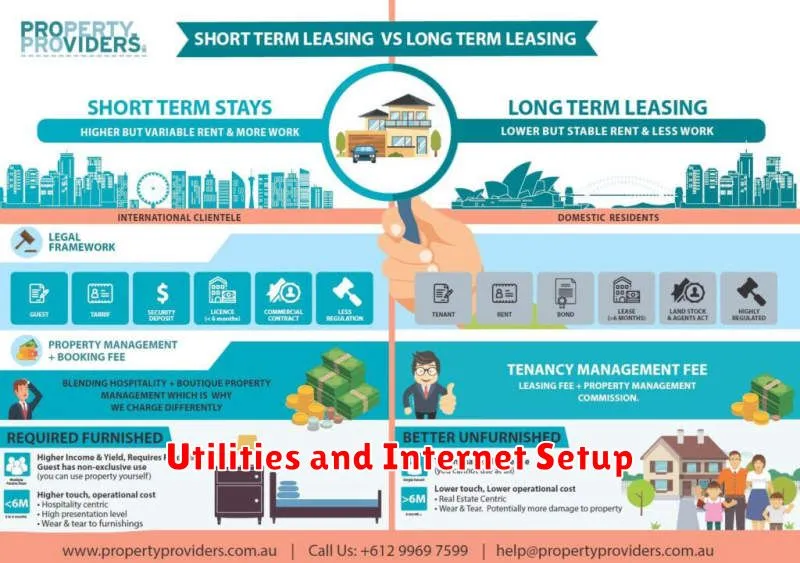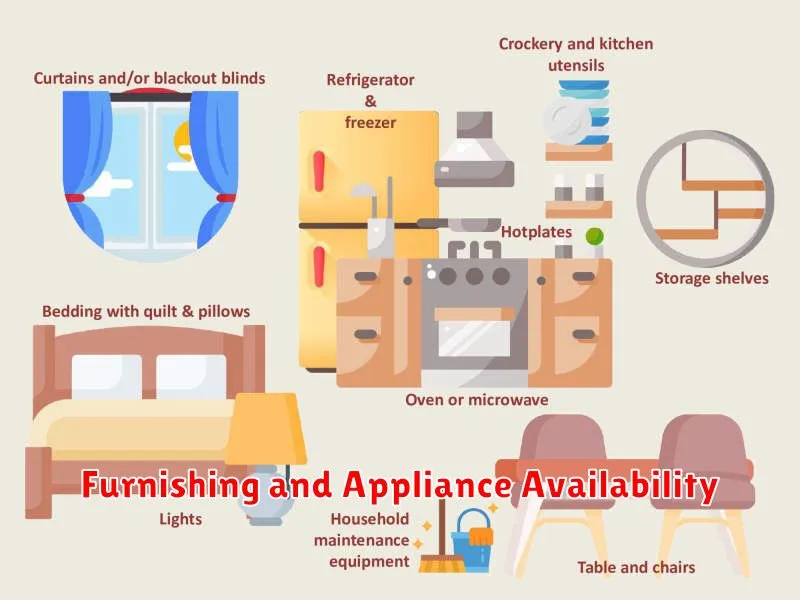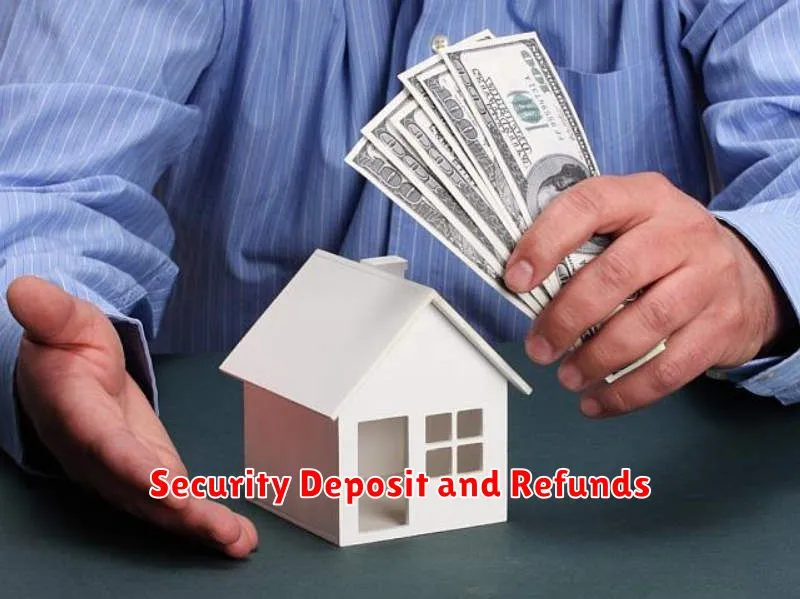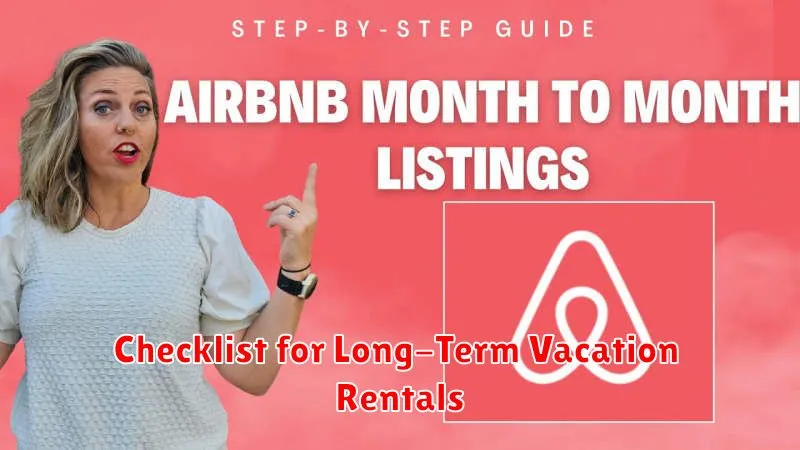Planning an extended getaway? A long-term vacation rental offers the comforts of home with the excitement of a new locale. Whether you envision a month-long ski retreat, a summer by the beach, or a sabbatical exploring a new city, securing the perfect long-term rental requires careful planning and consideration. This checklist will guide you through the essential steps to ensure a smooth and enjoyable experience in your temporary home, covering everything from budgeting and location scouting to lease agreements and packing essentials for a long-term vacation rental.
From understanding the nuances of long-term vacation rental leases to identifying must-have amenities for an extended stay, this comprehensive guide addresses key considerations. Finding the right long-term rental involves more than just browsing listings; it’s about aligning your needs and budget with the realities of living in a new place for an extended period. This checklist provides a framework for navigating the process efficiently, ensuring you find the perfect long-term vacation rental to suit your unique requirements.
Check Lease Terms Carefully
Before committing to a long-term vacation rental, thoroughly review the lease agreement. Pay close attention to key details that can significantly impact your stay.
Lease Duration
Confirm the exact start and end dates of the lease. Ensure the duration aligns with your travel plans. Understand the implications of breaking the lease early, including potential penalties.
Payment Schedule and Fees
Clearly understand the payment schedule, including the due dates for rent and any associated fees. Inquire about additional charges such as cleaning fees, utility costs, or security deposits. Verify the accepted payment methods.
Cancellation Policy
Familiarize yourself with the cancellation policy. Determine the conditions under which you can cancel the lease and the potential financial repercussions.
Understand Maintenance Policies
Before embarking on a long-term vacation rental, thoroughly understand the property’s maintenance policies. This includes knowing who is responsible for what. Clearly define the responsibilities of the landlord versus the tenant.
Typical landlord responsibilities include major repairs such as plumbing, heating, and structural issues. Tenants are generally responsible for minor maintenance like replacing light bulbs and keeping the property clean. However, specific responsibilities can vary greatly.
Review the lease agreement for specifics regarding maintenance procedures. This often includes contact information for emergency repairs and protocols for non-emergency situations. Understanding these policies beforehand can prevent misunderstandings and ensure a smooth rental experience.
Utilities and Internet Setup

Ensuring seamless utility services and reliable internet access is crucial for a comfortable long-term vacation rental experience. Take the time to confirm these details with the property owner or manager before your arrival.
Utilities
Electricity, water, and gas should be addressed. Clarify whether these are included in the rental fee or if they are the tenant’s responsibility. If the latter, obtain account information and ensure the services are active upon your arrival date. Understand the billing cycle and payment methods.
Internet
Confirm internet availability and the connection type. Inquire about the internet speed, especially if you plan to work remotely or stream media. Obtain the Wi-Fi network name and password in advance.
Other Considerations
If you require specific utilities like a landline telephone, verify its availability and associated costs. For stays during colder months, confirm the functionality of the heating system. Similarly, for warmer months, ensure the air conditioning is operational.
Furnishing and Appliance Availability

A well-furnished rental contributes significantly to a comfortable long-term stay. Thoroughly assess the provided furnishings. Is the furniture comfortable and in good condition? Is there adequate seating for dining and relaxing? A comfortable workspace is also crucial for those working remotely.
Appliances are essential for daily living. Confirm the presence and working condition of a refrigerator, stove/oven, microwave, and washing machine/dryer. Consider the availability of other appliances like a dishwasher, coffee maker, and toaster based on your individual needs. Ensure these appliances are in good working order and suitable for extended use.
Inventory the provided items before your arrival. This helps manage expectations and identify any potential needs you may have to address yourself. Discuss any missing essentials with the property owner or manager beforehand.
Local Emergency Contacts
Prior to your arrival, compile a list of essential local emergency contacts. This proactive step ensures you’re prepared for unforeseen situations.
Key Contacts:
- Local Police Department: Note their non-emergency number.
- Fire Department: As with police, record the non-emergency line.
- Nearest Hospital/Medical Clinic: Research facilities closest to your rental.
- Rental Property Manager/Owner: Maintain their contact information readily accessible for any property-related concerns.
Consolidating these contacts in a single, accessible location, such as on your phone or a printed document, will prove invaluable in times of need.
Security Deposit and Refunds

Security deposits are standard practice for long-term vacation rentals. They protect the property owner against potential damages or unpaid rent. Carefully review the rental agreement for details regarding the deposit amount and the conditions under which it will be held or returned.
Refund policies should be clearly outlined in the lease. Pay close attention to the timeframe for receiving your deposit back after your departure. The agreement should also specify the circumstances under which deductions might be made from the deposit, such as for damages, excessive cleaning, or unpaid utilities. Document the condition of the property upon arrival and departure with photos or videos to avoid disputes.
Ensure you understand the process for claiming your refund. This may involve submitting a written request or completing a specific form. Keep records of all communication with the property owner or manager regarding the security deposit and refund.
Dealing with Property Owners
Communication is key for a successful long-term vacation rental experience. Establish clear communication channels with the property owner from the outset. Discuss preferred methods of contact (e.g., email, phone) and expected response times.
Review the lease agreement thoroughly. Ensure you understand all terms and conditions, including responsibilities for maintenance, utilities, and any restrictions. Don’t hesitate to ask questions if anything is unclear. Address any concerns before signing the agreement.
Maintain respect for the property. Treat the rental as you would your own home. Report any maintenance issues promptly to avoid further damage. Understand the owner’s policies regarding guests and pets.

